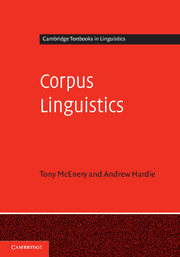Book contents
- Frontmatter
- Contents
- List of figures
- List of tables
- Acknowledgements
- Preface
- 1 What is corpus linguistics?
- 2 Accessing and analysing corpus data
- 3 The web, laws and ethics
- 4 English Corpus Linguistics
- 5 Corpus-based studies of synchronic and diachronic variation
- 6 Neo-Firthian corpus linguistics
- 7 Corpus methods and functionalist linguistics
- 8 The convergence of corpus linguistics, psycholinguistics and functionalist linguistics
- 9 Conclusion
- Glossary
- Notes
- References
- Index
7 - Corpus methods and functionalist linguistics
Published online by Cambridge University Press: 05 June 2012
- Frontmatter
- Contents
- List of figures
- List of tables
- Acknowledgements
- Preface
- 1 What is corpus linguistics?
- 2 Accessing and analysing corpus data
- 3 The web, laws and ethics
- 4 English Corpus Linguistics
- 5 Corpus-based studies of synchronic and diachronic variation
- 6 Neo-Firthian corpus linguistics
- 7 Corpus methods and functionalist linguistics
- 8 The convergence of corpus linguistics, psycholinguistics and functionalist linguistics
- 9 Conclusion
- Glossary
- Notes
- References
- Index
Summary
Introduction
In this chapter, we will show that an important trend in contemporary corpus linguistics is the coming-together of the analytic techniques, theories and findings of corpus linguists on the one hand, and on the other, of theoretical linguists of the school sometimes labelled as functionalist (or cognitive, or usage-based: see discussion in section 7.2 below); in the next chapter, we go on to develop a similar argument with regard to experimental psycholinguistics.
As the previous chapter illustrated, within corpus linguistics there is a distinction between two schools of thought which we have dubbed ‘neo-Firthian’ or ‘corpus-as-theory’ and by contrast, ‘corpus-as-method’ or ‘methodologist’. Across this chapter and the next, we will argue that the rapprochement between corpus linguistics and functional linguistics is evident in both the neo-Firthian and the methodologist traditions, but that it takes a rather different form in each. In the methodologist school, it has two manifestations. Firstly, functionalists have gradually been taking more and more regard of the importance of corpus evidence. For linguists working in a ‘usage-based’ paradigm, as we will see, a massive collection of ‘usage’ can be invaluable. Conversely, some corpus linguists – including, notably, Stefan Gries – have used functional and cognitive linguistics as a theoretical framework within which to interpret the outcomes of corpus analysis and from which to motivate new techniques for the investigation of corpus data. The rapprochement of the neo-Firthian school of corpus linguistics with functional-cognitive linguistics and psycholinguistics will be the topic of Chapter .
- Type
- Chapter
- Information
- Corpus LinguisticsMethod, Theory and Practice, pp. 167 - 191Publisher: Cambridge University PressPrint publication year: 2011



